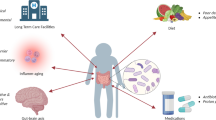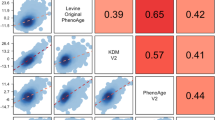Abstract
In spite of the potential benefit of lifelong food restriction to retard aging and extend life span, it is unrealistic in human. The restriction late in life may be more practical. There are, however, only limited studies on the effect of late onset caloric or dietary restriction. We and other investigators have shown that the late life restriction rejuvenates some parameters that decline with age in rats and mice. Although such studies may provide a basis for human application of late-life caloric or dietary restriction, the prolongation of maximum life span would not be expected in view of the current status of the long-lived population in which maximum life span potential appears to have already been achieved. The late life caloric restriction, however, could extend the health span if the extent were appropriate.
Similar content being viewed by others
References
Araki S, Goto S (2004) Dietary restriction in aged mice can partially restore impaired metabolism of apolipoprotein A-IV and C-III. Biogerontology 5:445–450
Dhahbi JM, Kim HJ, Mote PL, Beaver RJ, Spindler SR (2004) Temporal linkage between the phenotypic and genomic responses to caloric restriction. Proc Natl Acad Sci USA 101:5524–5529
FAOSTAT (United Nations Food Agricultural Organization Statistical Databases) Food Balance Sheet (2002). http://faostat.fao.org/faostat/form?collection=FBS&Domain= FBS&servlet=1&hasbulk=0&version=ext&language =EN
Finch CE, Tanzi RE (1997) Genetics of aging. Science 278:407–411
Fontana L, Meyer TE, Klein S, Holloszy JO (2004) Long-term calorie restriction is highly effective in reducing the risk for atherosclerosis in humans. Proc Natl Acad Sci USA 101:6659–6663
Gondo Y (2002) Report on international centenarian study (PI: Hirose N). Japan, Japan Foundation of Aging and Health, Ministry of Health, Labor and Welfare, pp 10–15 (in Japanese)
Goto S, Takahashi R, Kumiyama A, Radák Z, Hayashi T, Takenouchi M, Abe R (2001) Implications of protein degradation in aging. Ann New York Acad Sci 928:54–64
Goto S, Takahashi R, Araki S, Nakamoto H (2002) Dietary restriction initiated in late adulthood can reverse age-related alterations of protein and protein metabolism. Ann New York Acad Sci 959:50–56
Hursting SD, Perkins SN, Phang JM (1994) Calorie restriction delays spontaneous tumorigenesis in p53–knockout transgenic mice. Proc Natl Acad Sci USA 91:7036–7040
Ishigami A, Goto S (1990) Effect of dietary restriction on the degradation of proteins in senescent mouse liver parenchymal cells in culture. Arch Biochem Biophys 283:362–366
Kitani K, Goto S (2005) “My involvement in aging research was just a series of coincidences” An interview with Kenichi Kitani. Biogerontology 6:211–221
Masoro EJ (2000) Caloric restriction and aging: an update. Exp Gerontol 35:299–305
Masoro EJ (2003) Subfield history: caloric restriction, slowing aging, and extending life. Sci Aging Knowledge Environ 2003(8):RE2
McCay CM, Crowell MF, Maynard LA (1935) The effect of retarded growth upon the length of the life span and upon the ultimate body size. J Nutr 10:63–79
Ministry of Health, Labor and Welfare, Statistics and Information DepartmentMinister’s Secretariat, Japan (2004) Abridged life tables for Japan 2004. http://www.mhlw.go.jp/english/database/db-hw/lifetb04/4.html
Nagai M, Takahashi R, Goto S (2000) Dietary restriction initiated late in life can reduce mitochondrial protein carbonyls in rat livers: Western blot studies. Biogerontology 1:321–328
Radák Z, Takahashi R, Kumiyama A, Nakamoto H, Ohno H, Ookawara T, Goto S (2002) Effect of aging and late onset dietary restriction on antioxidant enzymes and proteasome activities, and protein carbonylation of rat skeletal muscle and tendon. Exp Gerontol 37:1423–1430
Sanz A, Caro P, Ibanez J, Gomez J, Gredilla R, Barja G (2005) Dietary restriction at old age lowers mitochondrial oxygen radical production and leak at complex I and oxidative DNA damage in rat brain. J Bioenerg Biomembr 37:83–90
Sharma R, Nakamura A, Takahashi R, Nakamoto H, Goto S (2006) Carbonyl modification in rat liver histones: decrease with age and increase by dietary restriction. Free Radic Biol Med 40:1179–1184
Shibata H (2002) Nutrition and longevity. Rev Clin Gerontol 12:97–107
Sinclair DA (2005) Toward a unified theory of caloric restriction and longevity regulation. Mech Ageing Dev 126:987–1002
Spindler SR (2005) Rapid and reversible induction of the longevity, anticancer and genomic effects of caloric restriction. Mech Ageing Dev 26:960–966
Takahashi R, Goto S (1987) Influence of dietary restriction on the accumulation of heat-labile aminoacyl tRNA in senescent mice. Arch Biochem Biophys 257:200–206
Vaupel JW, Carey JR, Christensen K, Johnson TE, Yashin AI, Holm NV, Iachine IA, Kannisto V, Khazaeli AA, Liedo P, Longo VD, Zeng Y, Manton KG, Curtsinger JW (1998) Biodemographic trajectories of longevity. Science 280:855–860
Walford RL, Mock D, Verdery R, MacCallum T (2002) Calorie restriction in biosphere 2: alterations in physiologic, hematologic, hormonal, and biochemical parameters in humans restricted for a 2-year period. J Gerontol A Biol Sci Med Sci 57:B211–B224
Weindruch R (1992) Effect of caloric restriction on age-associated cancers. Exp Gerontol 27:575–581
Weindruch R (1996) Caloric restriction and aging. Sci Am 274:46–52
Weindruch R, Walford RL (1982) Dietary restriction in mice beginning at 1 year of age: effect on life-span and spontaneous cancer incidence. Science 215:1415–1418
Acknowledgements
I acknowledge Dr. Hiroshi Shibata, Obirin University Graduate School and Dr. Yasuyuki Gondo, Tokyo Metropolitan Institute of Gerontology for their invaluable advice and information on nutritional status and longevity, and maximum life span potential of centenarians in Japan, and Dr. Kenichi Kitani, National Institute for Longevity Science, Japan for the discussion on CR in the interview with him (Kitani and Goto 2005).
Author information
Authors and Affiliations
Corresponding author
Rights and permissions
About this article
Cite this article
Goto, S. Health span extension by later-life caloric or dietary restriction: a view based on rodent studies. Biogerontology 7, 135–138 (2006). https://doi.org/10.1007/s10522-006-9011-4
Received:
Accepted:
Published:
Issue Date:
DOI: https://doi.org/10.1007/s10522-006-9011-4




